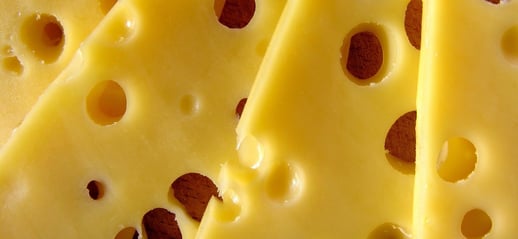
The coronavirus lockdowns across many European countries have brought a variety of new challenges for farmers and food producers. As well having to cope with an unprecedented demand for food and drink products resulting from shoppers panic buying and hoarding, many have had to adapt their usual practices in reaction to changes in supply chains and labour shortages.
An unfortunate consequence of this is that many producers of certain protected food products are struggling to continue to comply with the strict requirements for producing, processing and preparing their products.
What special protections are available for food and drink products?
There are currently three main types of special protection available for food and drink products in the EU:
- Protected geographical indication (PGI);
- Protected designation of origin (PDO); and
- Traditional speciality guaranteed (TSG).

PDO, PGI and TSG logos
A PGI indicates that at least one of the stages of production, processing or preparation takes place in a particular geographical area. “Yorkshire Wensleydale” and “Scottish Wild Salmon” are examples of foods that are protected with the designation PGI.
For a product to be protected under a PDO, it must be produced, processed and prepared in one area. “Cornish Clotted Cream” and “Blue Stilton cheese” have been afforded this advanced level of protection.
A TSG highlights that a product has a traditional composition or is produced according to a traditional method. “Traditionally Farmed Gloucestershire Old Spots Pork” is an example of a registered TSG.
Spotlight on France
PGIs and PDOs can both place strict requirements on the conditions under which a product must be produced. In France, some producers, particularly within the cheese industry, have struggled to continue to meet these requirements following the outbreak of COVID-19. Temporary modifications to some PGIs and PDOs have therefore been published in reaction to these difficulties.
In early April, the conditions for producing Emmental cheese (PGI “Emmental français est-central”) were temporarily modified, including in terms of collection and storage of milk. From 17 March 2020 and up to 14 days after the lifting of the measures taken to deal with the crisis, milk can be picked up every 5 milkings, rather than every other day. Further modifications have been made to conditions for manufacture and refinement.

Emmental cheese
There were amendments to production of other products, including to the cheese “Fourme de Montbrison”. From 25 March 2020 until two weeks after the lifting of the measures fighting COVID-19, producers of this cheese, which has PDO status, will be able to store milk up to 60 hours rather than for a maximum of 48 hours. The permitted temperature at which refining can be carried out has also been lowered.
Additional modifications were issued on 17 April 2020 to the conditions for production of the cheeses Saint-Nectaire, Bleu d'Auvergne, Fourme d'Ambert and Comté. These all have PDO status.
Spotlight on Italy
In Italy, there have been similar difficulties for producers of cheese. Some reports suggest that, in the first 15 days of March 2020, around 60% less milk was processed in the buffalo mozzarella supply chain than compared to the same period in 2019.

Buffalo mozzarella
Temporary modifications have been introduced to the PDO “Mozzarella di Bufala Campana” relaxing the requirement that the buffalo milk must be fresh and processed within 60 hours of milking, in order to allow freezing of raw milk in some limited circumstances.
In addition, several modifications have been made to the PDO “Parmigiano Reggiano”, including increasing the permitted milking time from 7 to 14 hours.
It is hoped these measures will help to reduce the impact of the COVID-19 crisis on the supply chains.
What can we expect next?
With lockdowns extending in many countries across Europe, the difficulties faced by food and drink producers seem set to continue for some time. Other countries with large numbers of recognised PGIs and PDOs may consider putting in place temporary modifications, following the examples of France and Italy, in order to make it possible for production of some of Europe’s most famous products to continue with minimal disruption.
Following Brexit, the UK government set up its own GI schemes and new GI logos were launched. Read more in our blog Signs of quality – EU and UK geographical indication (GI) logos.
Rebecca is a Partner and Chartered Trade Mark Attorney at Mewburn Ellis. She handles all aspects of trade mark work, with a particular focus on managing large trade mark portfolios, devising international filing and enforcement strategies, and negotiating settlements in trade mark disputes. Rebecca has extensive experience of trade mark opposition, revocation and invalidity proceedings before the UK Intellectual Property Office (UKIPO), including very complex evidence based cases. Rebecca also has a strong track record in overcoming objections raised to trade mark applications.
Email: rebecca.anderson@mewburn.com
Sign up to our newsletter: Forward - news, insights and features
Our people
Our IP specialists work at all stage of the IP life cycle and provide strategic advice about patent, trade mark and registered designs, as well as any IP-related disputes and legal and commercial requirements.
Our peopleContact Us
We have an easily-accessible office in central London, as well as a number of regional offices throughout the UK and an office in Munich, Germany. We’d love to hear from you, so please get in touch.
Get in touch
-2.png)
